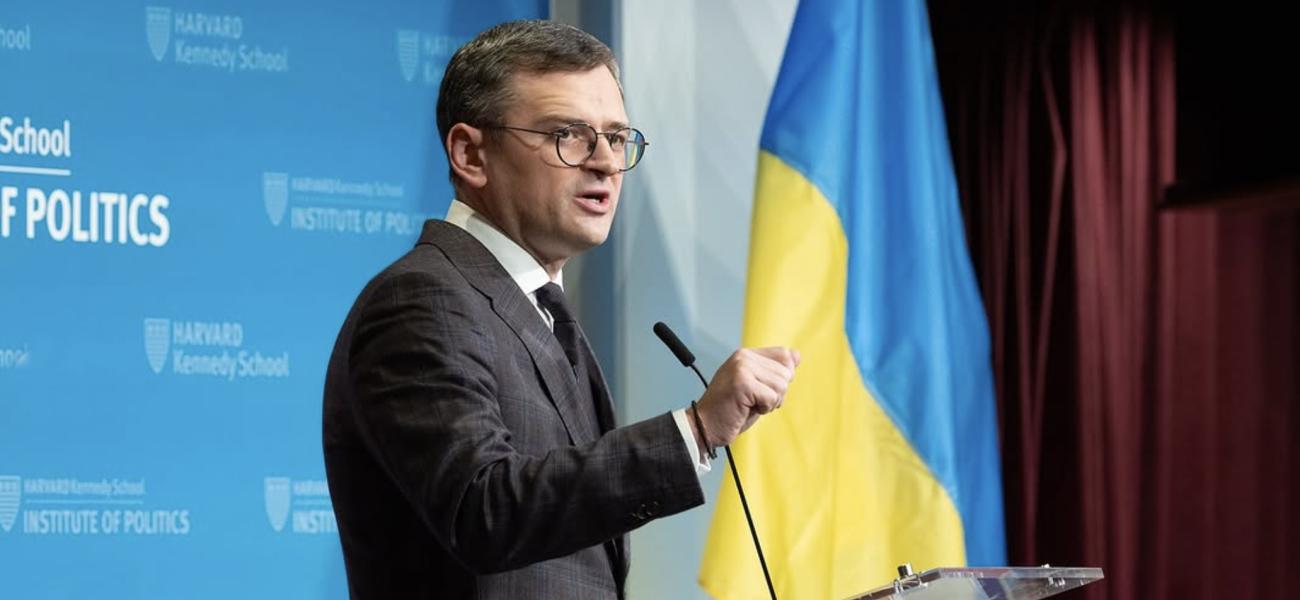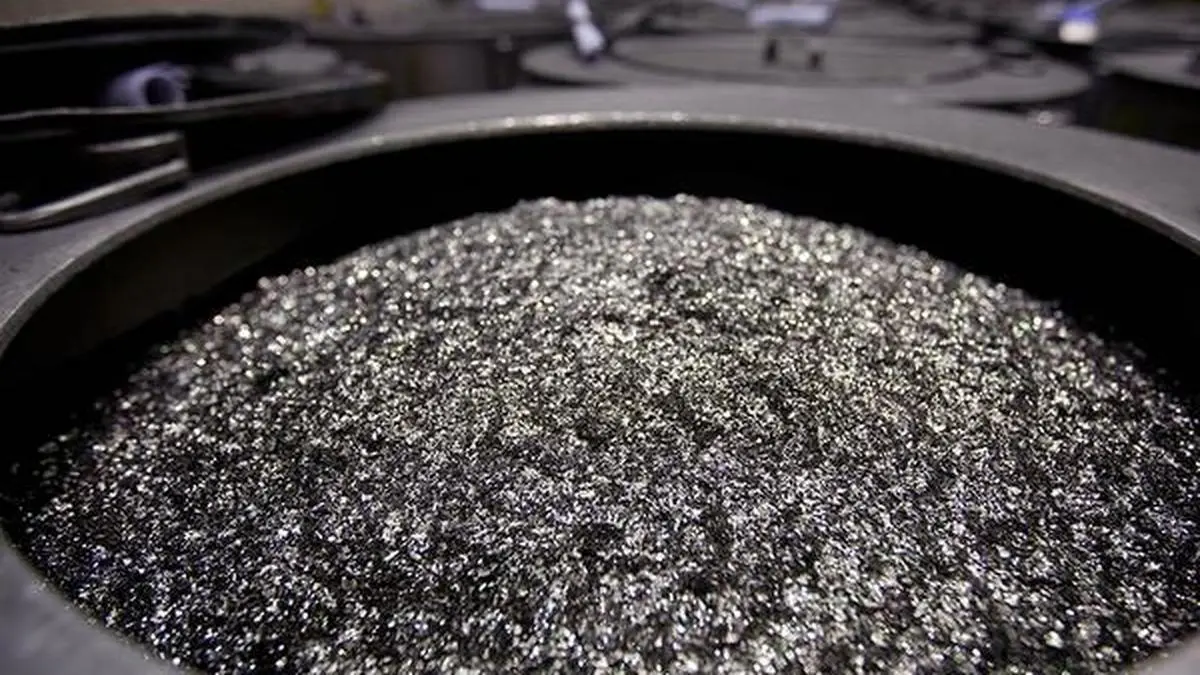On the third anniversary of Russia’s invasion of Ukraine, former Ukrainian foreign minister and senior fellow at the Belfer Center for Science and International Affairs Dmytro Kuleba delivered the Center’s 2025 Lamont Lecture, “A View from Ukraine.” In conversation with Belfer Center director Meghan O’Sullivan, Kuleba outlined his views on Ukraine’s ongoing talks with the Trump administration, the potential for a ceasefire and the future of Ukraine itself. Arguing that the Trump administration’s aim for a ceasefire was inherently misguided, Kuleba criticized what he saw as the West’s continuous misreading of Russia’s intentions and the lack of a coherent strategy to deal with Russia’s expansionist tendencies. Kuleba called on European countries to unite behind support for Ukraine and touched on his country’s dogged resilience throughout its conflict with Russia.
Kuleba accused Western nations of consistently misinterpreting Russia’s actions toward Ukraine. He recalled the 1994 Budapest Memorandum, in which Ukraine surrendered its remaining nuclear stocks for vaguely worded “security assurances” from Russia, the U.S. and U.K. In Kuleba’s eyes, Western countries misread Russian intentions. “While they saw the Budapest Memorandum as an act of denuclearization, Russia saw it entirely as an act of disarmament of Ukraine,” Kuleba said. “Russia always knew what it wanted to do to Ukraine,” he continued. “To achieve that, it first and foremost had to disarm it. Second, to shatter the unity of the Ukrainian nation. And third, to undermine the relationships Ukraine had with its neighbors.” An apparent victory for non-proliferation was instead the first act in Russia’s plan of neutralizing Ukraine.
Kuleba argued that even Ukraine’s partners continued to see the country through the Russian perspective. “For thirty years, the United States of America and the rest of the West looked at Ukraine through the eyes of Russia. Never willing to assess Ukraine on its own merits.” Russia only had one goal regarding Ukraine, which was to keep it within its own zone of influence. Until Russia’s optic of Ukraine as the plaything of great powers is removed, Kuleba declared, “Ukraine and nations like Ukraine will suffer and pay with their blood.” That same view persists even now, he claimed: “what happens today is the United States twists Ukraine’s arms and shakes the hand of Russia.”
Kuleba criticized the history of “resets” between Russia and the U.S., the results of the latter’s repeated failure to gauge Russia’s true intentions. He touched on Russia’s invasion of Georgia in 2008, which he said went unnoticed and unpunished by the West. Kuleba believes U.S. President Donald Trump’s current reconciliatory approach echoes Barack Obama’s attempted “reset” in 2009 and is equally doomed to failure. Kuleba outlined the “importance of understanding the strategic intentions of the other side,” and the consequences of failure to see that such an approach had continually failed to bear fruit.
Kuleba then confronted the so-called “realist” approach toward the war in Ukraine. “How many intellectual exercises do we have to undertake to accept the reality that sometimes a country decides to destroy another country, and whatever we do, trying to engage them or encourage them, they will not reciprocate?” he asked. Kuleba took aim at the Trump administration’s approach to international relations: “Where does realism take us if we throw human beings and nations into hell for the sake of believing realists, and believing that Russia … is someone [with whom] we can start over again?” In any case, a hasty deal to end the war would benefit only China and Russia. “President Trump is the only one here in a rush under the guise of stopping the war and people’s death,” Kuleba summarized. Vladimir Putin and Xi Jinping have the luxury of time, which Trump does not. Kuleba concluded his lecture by imploring his audience to alter their view of Ukraine and great power politics, “to look at the war not from the perspective of big nations fixing the world and dividing the world, but of a nation that deserves respect and recognition.”
Belfer’s Meghan O’Sullivan asked Kuleba about the prospects for a ceasefire in Ukraine. Despite the Trump team’s desire for a ceasefire, Kuleba responded, whatever they achieve will not be sustainable. “It won’t hold because everything we know about Russia is that it will remain focused on its ultimate goal of destroying Ukrainian statehood.” The length of the front and the number of troops means that any local flare-up would be used by the Russians as an excuse to escalate, for which they would inevitably blame Ukraine, he said. In so doing, Russia would expose the West’s inability to stop the war. Kuleba noted that neither Europeans nor Americans had yet internalized that “the second goal of Putin after Ukraine is to expose the weakness of the West to the whole world.”
O’Sullivan suggested the Trump administration was attempting a “reverse Nixon” to drive a wedge between Russia and China. In Kuleba’s view, Russia will not reconcile with the U.S. at China’s expense. The Russo-Chinese relationship is mutually beneficial: Xi’s China understands Putin’s Russia and the many commitments the latter has signed with it, and it gives Putin a “guarantee” of support in confronting the West.
Regarding security guarantees, Kuleba argued that only NATO membership would be sufficient to deter further Russian aggression. All “assurances” provided to date had failed. Kuleba acknowledged that what would deter Putin remained an “open question,” especially considering NATO’s uncertain future as Trump’s second presidency continues. On the viability of Ukraine joining NATO, Kuleba argued that Russia’s fear of NATO was a fig leaf to justify its destruction of Ukrainian statehood. Ukraine was constitutionally a non-bloc country when Russia invaded in 2014, and Russia did nothing to prevent its neighbor Finland joining NATO. For Kuleba, Russia attacked “because freedom and repression are irreconcilable. Independent Ukraine and repression are irreconcilable.”
Though the putative Ukraine minerals deal is not a bad idea per se, Kuleba opined, it has been handled disastrously. Firstly, he argued, the current administration could not retroactively turn a grant into a loan. Secondly, Ukrainian President Volodymyr Zelenskyy needs certainty about what the U.S. would provide for Ukraine in return for signing the deal, which Trump’s negotiating team has not provided. The third—and main—issue is what price Ukraine would have to pay for peace if this was the cost of a ceasefire. U.S. negotiators were unable to persuade Putin to halt missile attacks on Ukraine even for one day. Ukraine will now be wary should the price for peace become more burdensome than that of the war itself.
Asked by audience members about how small countries could deter external aggression, Kuleba urged them to “arm and unite.” “The era of peace is gone,” he declared. “War is the new normal. Armament is in fashion, because it is needed to survive in this reality.” At the same time, Kuleba’s diplomatic experience has taught him that the quality of allies matters more than their quantity. “You need those who are ready to stand by you and offer to assistance to you no matter what others does,” he said. Kuleba also stressed the importance of internal unity, as he had witnessed in Ukraine. The first attack arrives not with missiles or soldiers, he added, but an “attack on the mind … convincing the nation that defending yourself is hopeless.”












